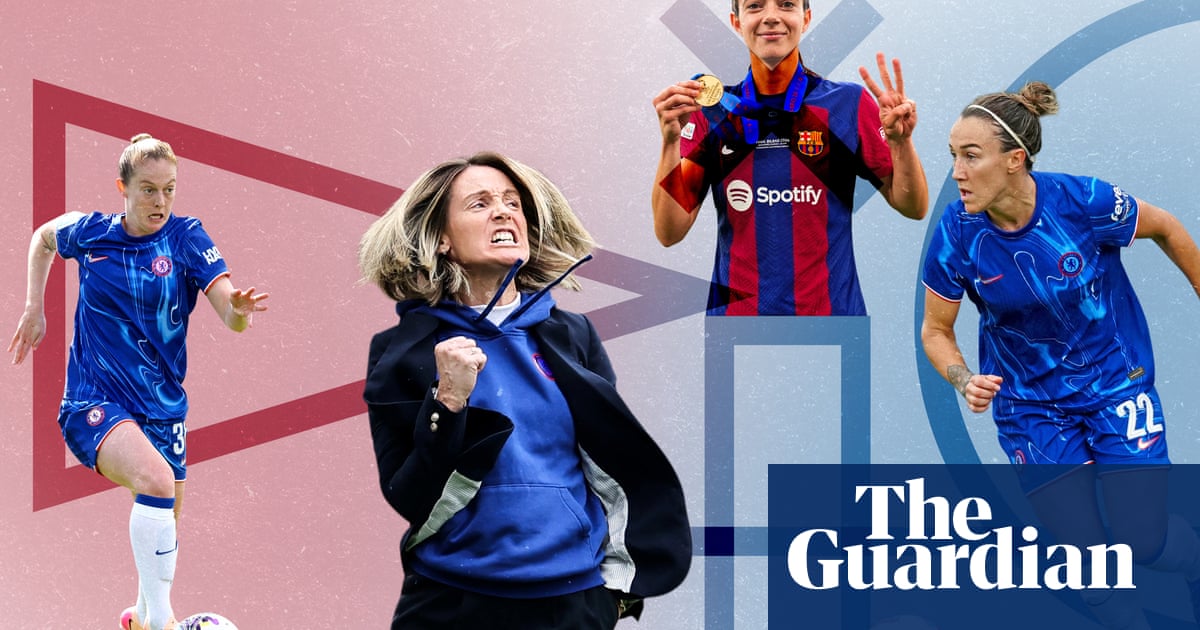As Chelsea’s quest for a quadruple enters its final month, there is no more imposing obstacle to navigate than this. Barcelona, the European champions in three of the past four campaigns, are once again standing in the way of the English champions as Chelsea strive to lift the only major trophy that has eluded them, and there could be no more worthy adversary.
There is more than a hint of deja vu about this semi-final. Not only because the first and second legs are taking place on the same dates, 20 April and 27 April, as they did last season, but also because it is the third straight year in which they have gone head-to-head at this stage, which both clubs can feel a touch unfortunate about. Once was tantalising. The rematch was welcome. The trilogy sounds enthralling but comes with a lingering sense that it might have been the final.
This is the first time in the competition’s history that the same two clubs have met in three consecutive semi-finals and there is a strong case that Barcelona and Chelsea have looked like the top two teams in Europe in all three campaigns. Yet this time there are striking differences.
On the pitch, if you can’t beat them, sign them? Chelsea will hope thatlast summer’s additionof the England right-back Lucy Bronze, on a free transfer, andJanuary’s acquisitionof her Lionesses teammate Keira Walsh, for €550,000 (£470,000), from Barcelona can swing the tie in their favour. Bronze has lifted the European title five times, a feat only one other British footballer – Gareth Bale – can match. For a club aspiring to win their first Champions League, what better than to bring in players who have been there and done it?
In the dugout, that same principle applies and it is understood to have been a major factor in Chelsea’s decision to hire Sonia Bompastor after a comprehensive recruitment process to find Emma Hayes’s replacement. The Frenchwoman is, thanks to her2022 triumph with Lyonin Turin, beating Barcelona in the final, the only female coach to have won this trophy in the past 16 years. Martina Voss-Tecklenburg’s 2009 success with the German club Duisburg was so long ago that the competition went by a different name, the Uefa Women’s Cup. Bompastor is the only woman to have won the tournament as a player and manager.
Helpfully, she is also the only coach since the start of the 2020-21 season to have prevented Barcelona from winning the competition. So when Chelsea were searching for somebody who could elevate them to the next level, there was no stronger CV.
And it was not only Bompastor whom Chelsea snapped up from Lyon last summer. In too came the assistant coach Camille Abily, Bompastor’s long-term partner with whom she has four children. Abily is the Women’s Champions League’s joint-sixth top scorer with 43 goals and has made the 10th-highest number of appearances in the competition (81), including one against Barcelona in the 2017-18 quarter-finals, which concluded in victory for the French side.
That was in a time before the Catalan club developed their aura in the women’s game, though, when a much younger Aitana Bonmatí – now the back-to-back Ballon d’Or winner – was a substitute, learning her craft. The 27-year-old has blossomed into the most revered playmaker in the world, the Laureus sportswoman of the year for 2024 and the Women’s Champions League player of the season two times in a row.
It was Bonmatí who opened the scoring in the second leg oflast year’s semi-final, which ended in a comeback win for the holders and immense disappointment for 10-player Chelsea, who lamented what Hayes described as the “worst decision in Champions League history” after the sending-off of Kadeisha Buchanan. Hayes would have to settle for leaving Chelsea for the United States without lifting this cup in her otherwise trophy-laden 12-year era.
Since Bompastor’s arrival, when few imagined anybody could match the dominance Hayes oversaw, Chelsea have lost only once, and some might say even that does not count, given it was in the first leg of their Champions League quarter-final against Manchester City which theyfought back to winon aggregate.
Sign up toMoving the Goalposts
No topic is too small or too big for us to cover as we deliver a twice-weekly roundup of the wonderful world of women’s football
after newsletter promotion
The prospect of an unbeaten league season is four matches away and Chelsea are through to a Women’s FA Cup final against Manchester United, having lifted the League Cup with victory over Manchester City in March’s final.
The trophy the club want above all else, though, is the continent’s top prize. Standing between them and what would be only a second appearance in the final by a British club since 2007 are an in-form Barcelona, who have scored 11 goals in their past two matches and were10-2 aggregate winnersover Wolfsburg in the quarter-finals. Chelsea will take them on without Lauren James, who has a hamstring injury, the club confirmed on Friday.
Pere Romeu, Barcelona’s coach, told Uefa he anticipated a “difficult tie”, saying: “Chelsea are a team who feel comfortable attacking at pace, comfortable attacking on the flanks with players who get past their marker and they get numbers in the box, [and] comfortable out of possession. I think this means we’ll have a knockout that’ll feel long, a tie in which we’ll try to play well out of possession, try to win the ball back and hit Chelsea on the counter, and when in possession we’ll try to get down the flanks quickly.”
When these sides met in 2021’s final, which ended in a chastening4-0 defeat for Chelseain the eerily quiet Swedish port city of Gothenburg during the Covid pandemic, Barcelona’s ability to attack quickly down the flanks largely proved Chelsea’s undoing. Since then Chelsea have grown, evolved, improved. How much? We are about to find out.
